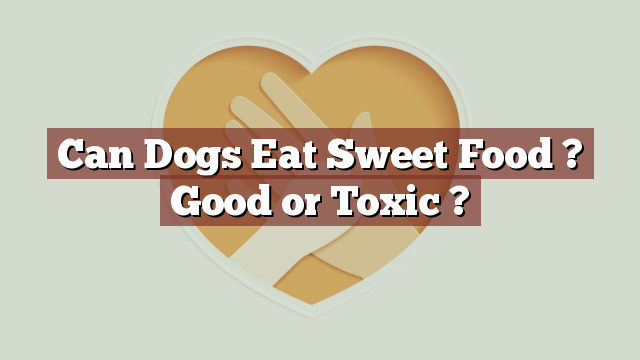Can Dogs Eat Sweet Food? Good or Toxic?
As pet owners, it is crucial for us to be aware of what foods are safe for our furry friends. One common question that often arises is whether dogs can consume sweet food. The answer to this question is not as straightforward as it may seem, as some sweet foods can be harmful to dogs, while others can be safely incorporated into their diet. In this article, we will explore the nutritional value of sweet food for dogs, discuss the safety and toxicity concerns associated with these foods, examine potential risks and benefits, and provide guidance on what to do if your dog consumes sweet food.
Nutritional Value of Sweet Food for Dogs
Sweet food typically contains high amounts of sugar, which can provide a quick source of energy. However, it is important to note that dogs have different nutritional requirements compared to humans. While they do require carbohydrates for energy, their diet primarily consists of proteins and fats. Therefore, sweet food should not be a significant part of their regular diet.
Can Dogs Eat Sweet Food? Safety and Toxicity
Can dogs eat sweet food? The answer to this question depends on the type and quantity of sweet food. While small amounts of natural sweeteners, such as honey or fruits, can be safe for dogs, other sweeteners, such as artificial sweeteners, can be harmful or even toxic to them.
Artificial sweeteners like xylitol, commonly found in sugar-free products, are particularly dangerous for dogs. Even small amounts of xylitol can lead to a sudden release of insulin in a dog’s body, resulting in a rapid drop in blood sugar levels. This can cause symptoms such as lethargy, vomiting, loss of coordination, seizures, and in severe cases, liver failure. Therefore, it is crucial to avoid giving dogs any sweet food that contains xylitol.
Potential Risks and Benefits of Dogs Consuming Sweet Food
While some sweet foods can pose risks to dogs, others can offer certain health benefits when consumed in moderation. Natural sweeteners like honey and fruits can provide dogs with essential vitamins, minerals, and dietary fiber. However, it is important to remember that sweet food should only make up a small portion of a dog’s overall diet. Excessive consumption of sweet food can lead to obesity, dental issues, and digestive problems in dogs.
What to Do if Your Dog Eats Sweet Food
If your dog consumes sweet food that is unsafe or toxic, it is crucial to act quickly. If you suspect that your dog has ingested a toxic substance such as xylitol, you should immediately contact your veterinarian or a pet poison helpline. Time is of the essence when dealing with potential poisoning, so it is important to seek professional advice without delay. In less severe cases, it is recommended to monitor your dog for any signs of discomfort or adverse reactions and consult your veterinarian if necessary.
Conclusion: Understanding the Effects of Sweet Food on Dogs
While dogs can consume small amounts of certain sweet foods without harm, it is important to be cautious and informed to ensure their well-being. Dogs should never be given sweet food containing xylitol, as it can be extremely toxic to them. Natural sweeteners, like honey or fruits, can offer some nutritional benefits when given in moderation, but they should not replace a balanced diet suitable for dogs. It is always best to consult with a veterinarian before introducing any new food into your dog’s diet. By understanding the potential risks and benefits associated with sweet food, we can make informed choices and keep our canine companions safe and healthy.
Thank you for investing your time in exploring [page_title] on Can-Eat.org. Our goal is to provide readers like you with thorough and reliable information about various dietary topics. Each article, including [page_title], stems from diligent research and a passion for understanding the nuances of our food choices. We believe that knowledge is a vital step towards making informed and healthy decisions. However, while "[page_title]" sheds light on its specific topic, it's crucial to remember that everyone's body reacts differently to foods and dietary changes. What might be beneficial for one person could have different effects on another. Before you consider integrating suggestions or insights from "[page_title]" into your diet, it's always wise to consult with a nutritionist or healthcare professional. Their specialized knowledge ensures that you're making choices best suited to your individual health needs. As you navigate [page_title], be mindful of potential allergies, intolerances, or unique dietary requirements you may have. No singular article can capture the vast diversity of human health, and individualized guidance is invaluable. The content provided in [page_title] serves as a general guide. It is not, by any means, a substitute for personalized medical or nutritional advice. Your health should always be the top priority, and professional guidance is the best path forward. In your journey towards a balanced and nutritious lifestyle, we hope that [page_title] serves as a helpful stepping stone. Remember, informed decisions lead to healthier outcomes. Thank you for trusting Can-Eat.org. Continue exploring, learning, and prioritizing your health. Cheers to a well-informed and healthier future!

